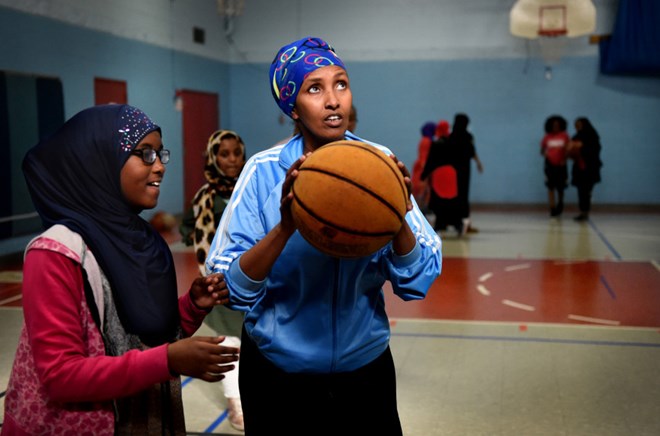
Saturday April 8, 2017
By Josh Verges

Fartun Osman, center, coaches basketball teams at West Minnehaha Recreation Center in St. Paul on Wednesday, April 5, 2017. Fartun, a physical education teacher at Higher Ground Academy charter school in St. Paul was supposed to coach the Somali national women’s basketball team in a tournament last month in Egypt. It would have been the country’s first such team in 26 years, but most of the team got stuck in Dubai because of visa problems. Jean Pieri / Pioneer Press
While playing professional basketball in Somalia in the 1980s, Fartun Osman and her teammates wore tight shorts and no hair covering.
“Nobody was judging us because we had a government that was stable and protecting us,” she said.
Osman, now 40 and living in Woodbury, returned to her home country in December to coach in a tournament that signaled the defiant rebirth of Somali women’s basketball decades after its civil war began.
Amid death threats from al-Shabaab terrorists and denunciations from moderate clerics, teenage girls and young women in long pants and hijabs played under the protection of armed soldiers on rooftops.
“Every time we stepped on the court, it was scary for us,” said Osman, a youth sports coach and physical education teacher at the St. Paul charter school Higher Ground Academy.
The tournament featured four players each from Minnesota and Canada alongside players from several regions of Somalia. Somalia’s best and four players from the diaspora then were selected for a larger stage in March.
For the first time in 26 years, Somalia was sending a team to an international tournament in hopes of qualifying for the 2018 Women’s Basketball World Cup and the 2020 Olympics.
The Somali comeback, however, never got off the ground.
Osman, a team organizer and four North American players — including Osman’s daughter, Hindi Abdi — arrived without delay for the games in Cairo, Egypt.
But eight teammates and the head coach never completed the trip. They got stuck at the airport in Dubai for three days and then flew back to Somalia.
Osman was willing to suit up to fill out the starting lineup but was told she’d need more than five to play. After raising money for the trip and receiving no pay, Osman and her team were forced to forfeit, settling for some scrimmages before returning home.
“It was really sad,” she said. “After you do all that, they can’t play. It’s hard for us.”
TRAVEL BAN
Osman thinks the airport problems were related to President Donald Trump’s ban on travel to the U.S. from Somalia and five other Muslim-majority nations.
The team had documentation that they were to receive their visas once they got to Cairo, but they weren’t allowed to board their connecting flight. The team from Uganda, which is not part of Trump’s travel ban, was allowed to travel through Dubai without visas, Osman said.
“They don’t care that these are players who had their passes, who had the right to play. They went back home,” she said.
Lorne Riley, spokeswoman for Dubai Airports, said he was not aware of the Somali team’s travel problems and couldn’t speak to how Trump’s order might have affected travel through Dubai to destinations outside the U.S.
NOT STOPPING
The failed trip has not deterred Osman. There will be another qualifying tournament in 2019, and Osman intends to field a competitive team.
“We’re not stopping. We’re going to come back strong,” she said.
Osman takes inspiration from her father, who stayed in Somalia during the civil war, helping and feeding people before al-Shabaab killed him in 2011. She sees women’s sports as a necessary component of a restabilized Somalia.
“We’re trying to let our kids know that our country was safe before and we can take that back again, but it’s going to be hard work,” she said.
The Somali men’s team had the same travel problems, Osman said, but because it had nine diaspora players, enough of them showed up to play.
Osman said she’ll urge FIBA, the governing body for international basketball, to advocate for her traveling players. But she’s unwilling to stack the team with players living in North America.
The Somali players who have been risking their lives to practice and play deserve to represent their country, she said.
“They see someone who was shot to death. They don’t have shoes to play. Maybe they didn’t get their first meal today and they still want to play. They’re the ones who should play,” she said.
Osman related the attitude of the team’s head coach, Mulki Noor Mudey, whom she called the Michael Jordan of Somali women’s basketball.
“She’s coaching inside the civil war and will tell you, ‘If it’s my time, I have to go, but nobody’s going to tell me I’m not going to play,’ ” Osman said.